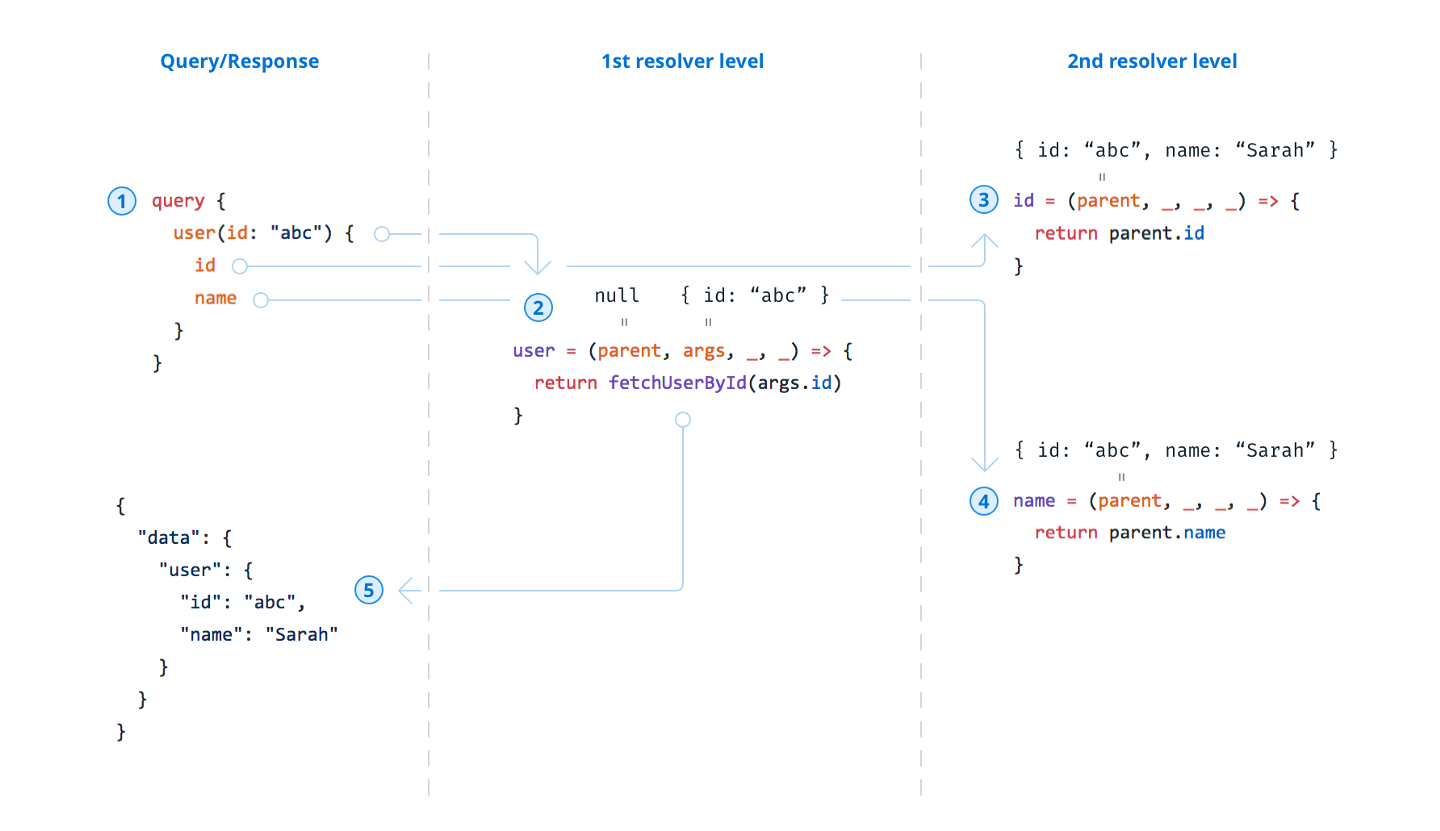https://www.apollographql.com/docs/react/advanced/fragments.html
A GraphQL fragment is a shared piece of query logic.
- Sharing fields between multiple queries, mutations or subscriptions.
- Breaking your queries up to allow you to co-locate field access with the places they are used.
fragment NameParts on Person {
firstName
lastName
}
query GetPerson {
people(id: "7") {
...NameParts
avatar(size: LARGE)
}
}Schema:
import {
GraphQLSchema, GraphQLObjectType, GraphQLInterfaceType, GraphQLEnumType,
GraphQLList, GraphQLNonNull, GraphQLString, GraphQLID
} from 'graphql'
const schema = new GraphQLSchema({
query: new GraphQLObjectType({
name: 'Query',
fields: {
user: {
type: UserType,
args: {
id: { type: GraphQLID }
},
resolve: (root, args, context, info) => {
const { id } = args // the `id` argument for this field is declared above
return fetchUserById(id) // hit the database
}
}
}
})
})Server:
const express = require('express')
const graphqlHTTP = require('express-graphql')
const app = express()
app.use('/graphql', graphqlHTTP({
schema: schema,
graphiql: true
}))
app.listen(4000)Alternatively, options can also be provided as a function (or async function) which returns this options object:
app.use('/graphql', graphqlHTTP(async (request, response, graphQLParams) => ({
schema: schema,
rootValue: await someFunctionToGetRootValue(request),
graphiql: true
})))Dependencies:
$ npm install --save graphql express-graphqlYou can generate the client schema file schema.graphql (example; relay-compiler needs this file) from the GraphQLSchema object by using printSchema from graphql/utilities. Example: relayjs/relay-examples/todo/scripts/updateSchema.js
https://graphql.org/graphql-js/running-an-express-graphql-server/
In the example above:
(root, args, context, info) => {
const { id } = args
return fetchUserById(id)
}A resolver function takes four arguments (in that order):
parent: The result of the previous resolver call (more info)args: The arguments of the resolver’s fieldcontext: A custom object each resolver can read from/write toinfo: contains the query AST and more execution information (more info)
Every GraphQL field has its own resolver function. If you don't define the resolver function, the default function is just to take appropriate field from the parent object.
https://facebook.github.io/relay/docs/en/graphql-server-specification.html
https://github.com/graphql/graphql-relay-js
See also the Relay Next.js examples linked below.
https://stackoverflow.com/questions/37635328/what-is-the-meaning-of-viewer-field-in-graphql
https://github.com/graphql-python/graphql-core-next
from graphql import GraphQLSchema, GraphQLObjectType, GraphQLField, GraphQLString
schema = GraphQLSchema(
query=GraphQLObjectType(
name='RootQueryType',
fields={
'hello': GraphQLField(
GraphQLString,
resolve=lambda obj, info: 'world')
}))
from aiohttp_graphql import GraphQLView
from aiohttp import web
app = web.Application()
GraphQLView.attach(app, schema=schema, graphiql=True)
web.run_app(app)If you need to create schema.graphql file, for example for relay-compiler:
from graphql import print_schema
from pathlib import Path
Path('schema.graphql').write_text(print_schema(schema))Alternatives:
- https://github.com/graphql-python/flask-graphql
- https://docs.graphene-python.org/projects/django/en/latest/
- https://github.com/graphql-python/sanic-graphql
https://github.com/graphql/express-graphql/blob/master/examples/index.js
https://github.com/apollographql/starwars-server/blob/master/data/swapiSchema.js
https://github.com/messa/graphql-playlist
https://github.com/facebook/dataloader
$ npm install --save dataloadervar DataLoader = require('dataloader')
var userLoader = new DataLoader(keys => myBatchGetUsers(keys))Warning: DataLoader is caching the data by default. Possible solutions:
- diasble caching - but also disables deduplication
- create a new DataLeader(s) for each request
- https://github.com/facebook/dataloader#caching-per-request
- this needs special attention in case of subscriptions
- clear the cache by calling
userLoader.clearAll() - clear just a specific key:
userLoader.clear(42)
Next.js:
- https://github.com/zeit/next.js/tree/canary/examples/with-relay-modern
- https://github.com/zeit/next.js/tree/canary/examples/with-relay-modern-server-express
- https://github.com/zeit/next.js/tree/canary/examples/with-apollo
https://www.prisma.io/blog/graphql-server-basics-the-schema-ac5e2950214e
https://www.prisma.io/blog/reusing-and-composing-graphql-apis-with-graphql-bindings-80a4aa37cff5/
